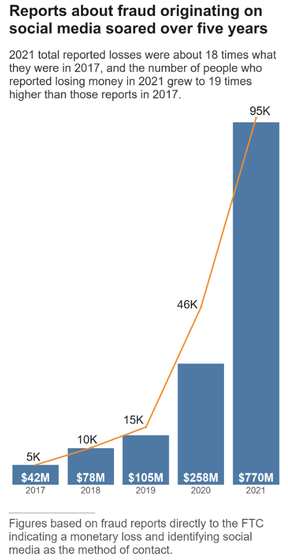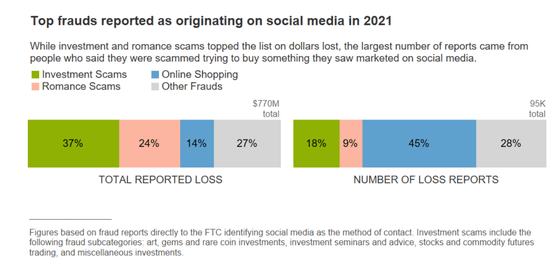Investment fraud such as virtual currency has more than doubled online, and the victims are mainly young people

The Federal Trade Commission (FTC) has released a report on online fraud in 2021. According to it, frauds claiming to invest in virtual currencies are increasing, and the damage is spreading especially to young people with low financial literacy.
Social media a gold mine for scammers in 2021 | Federal Trade Commission
FTC Finds Huge Surge in Consumer Reports about Losing Money To Scams Initiated Through Social Media | Federal Trade Commission
https://www.ftc.gov/news-events/press-releases/2022/01/ftc-finds-huge-surge-consumer-reports-about-losing-money-scams
Crypto leads to massive surge in online scams --Axios
https://www.axios.com/crypto-scam-ftc-2079c3b2-6237-4ff8-92f2-d08382cd0d70.html
According to FTC, more than 95,000 people reported fraud on social media platforms in 2021. In 2020, there were about 46,000 people, which means that the number of victims has more than doubled in one year. In 2021, the total damage caused by online fraud was $ 770 million, nearly three times the $ 258 million in 2020. The $ 258 million damage caused by online fraud accounts for approximately 25% of the total damage reported in 2021 for all fraud cases.

Looking at the victims by age group, the number of victims aged 18 to 39 was 2.4 times that of those aged 40 and over, indicating that online fraud damage is spreading mainly to young people.
The most damaging online scams were those that invested in cryptocurrencies and stocks. According to the FTC report, 'Social media platforms are often used for investment fraud, especially for cryptocurrency investment fraud. More than half of the people who reported the damage of investment fraud in 2021 were fraudsters on social media. I made contact. '

Romance scams were the second most damaging after cryptocurrency-related scams. Romance scams are special scams that trick people you meet on social media into sending money by acting as if you were a lover or fiancé. A report released by FTC in March 2021 reported that romance scams were on the rise due to restrictions on going out due to the spread of the new coronavirus infection.
The damage of 'romance scam' that tricks the other party with the power of love has increased by 50%, is it due to the new corona?-GIGAZINE

And although the amount of damage is the third, the most reported damage was fraud related to online shopping. Of the fraudulent reports of online shopping, 70% said, 'I saw an ad and placed an order, but the item didn't ship after I paid.' Nearly 90% of the victims who reported that the product was not shipped answered that they saw the advertisement on Facebook or Instagram. There are also tricks to trick you into fake websites that look exactly like existing websites.
FTC cites the following five points to avoid online fraud on social media.
-Set restrictions in your privacy settings to limit who can see your posts on social media.
・ Check if you can stop targeting advertising.
・ If you receive a message from a friend saying 'I have a good story' or 'I need money urgently', it is possible that the friend's account has been hacked, so call that friend to confirm. Be especially careful if you are asking for payment by virtual currency, gift card, or wire transfer.
・ If someone you don't know on social media tells you to 'become a friend' or 'let's get along', deal calmly. Naturally, don't send money to people you've never met.
・ Before purchasing a product on the Internet, search and check by adding keywords such as 'fraud' and 'complaint' to the company name of the sales company.
Related Posts:
in Web Service, Security, Posted by log1i_yk






